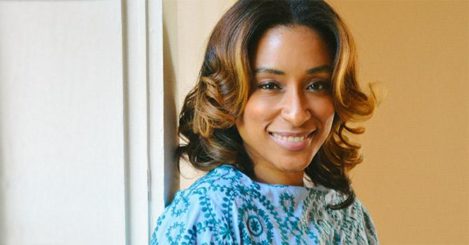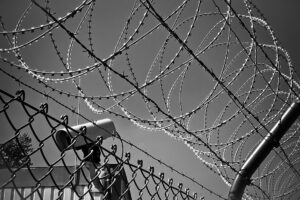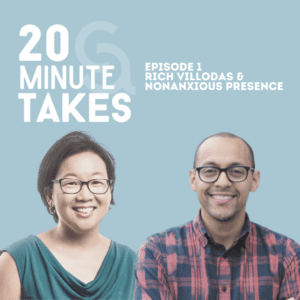
The Rev. Dr. Neichelle Guidry takes seriously her job as counselor, coach, motivator and model for young black women in in ministry and faith.
Guidry, who has been recognized as a national faith leader by publications like Time and Ebony, is a graduate of Clark Atlanta University and Yale Divinity School, and has a Ph.D. from Garrett-Evangelical Theological Seminary. She is the founder of shepreaches, an organization that exists to support black millennial women in ministry, and she serves as Dean of Sisters Chapel and director of the Women in Spiritual Discernment of Ministry (WISDOM) Center at Spelman College in Atlanta, Georgia.
“It really encourages me to work with students who recognize that God calls us in so many ways and to so many things,” Guidry says. “At the chapel and at the WISDOM Center, that work is leading the vocational journey through this lens of sisterhood…I’m trying to demolish the idea that you can get to where God intends for you to go on your own—this patriarchal idea that we can thrive in individuality, that we can do ministry without the strength and the fortification of other women.”
“I’m trying to demolish the idea that you can get to where God intends for you to go on your own—this patriarchal idea that we can thrive in individuality, that we can do ministry without the strength and the fortification of other women.”
Guidry recently spoke with Duke Divinity’s Faith and Leadership about leading the vocational journey through the lens of sisterhood.
Faith and Leadership: Earlier this year, you wrote an article that posed the question: Can an institution built on the backs of women be the one to liberate them? In the position you’re in now, how can you help women who may be considering a call to ministry in the institutional church?
Guidry: I was having brunch with a colleague yesterday after we both finished preaching, and I was saying that it’s a challenge for me daily to be building close relationships with young women who are pretty sure they’re going to be doing some kind of ministry in a church.
And I swear, I’m trying to bite my tongue, because I don’t want to be the one to dissuade them. I don’t want to be the one to destroy their fantasy. I don’t want to be the one to demystify the call of God to do congregational ministry.
But I do feel called to be really truthful with my students, [and tell them]: There are going to be things that you’re going to face in these churches as young black women that you will not be educated on how to handle when you go to divinity school. So in some way, shape or form, I pray and I hope that I can have some kind of conversation or give some kind of insight, foresight, into how to navigate racist and sexist spaces while keeping your sanity, while knowing that God still approves and affirms and loves you.
Because I have my doubts that the church will liberate women. I believe that women of faith can liberate women. I believe that strong women will liberate women. I believe that churchlike things can save and liberate people, right? I think about womanist churches that are popping up. I think about even the sacraments—outside the structure of the church politic, the sacraments are so powerful for liberating people. But these churches being ridden with the politics that they are, I don’t see a lot of hope there. Maybe that’s God’s ongoing work that has to be done in my life.
“I have my doubts that the church will liberate women. I believe that women of faith can liberate women.”
Faith and Leadership: As you look around the landscape now, are there experiments or innovations, either within the institutional church or outside it, that you find particularly inspiring?
Guidry: Two of my really good friends, Andrew Wilkes and Gabby Cudjoe Wilkes, are planting a church in Brooklyn called the Double Love Experience. I’m so excited that they’ve chosen to create an intentional community for people who have felt marginalized in churches.
They have such a heart for justice and such a heart for Christ, and so I’m excited to see how they build a ministry right in that intersection.
A couple of other people who have me excited about what God is doing: one of my girlfriends, Dr. Eboni Marshall Turman, is one of these people who represent that black women have a right to be frustrated but that frustration is sacred and it’s holy—her articulation of not just how churches have failed black women, but how black women have remained faithful to it. I love her work.
I love The Millennial Womanism Project spearheaded by Liz Alexander and Melanie Jones. They created this project that mined the whole country for black women under 40 using womanism as a framework for living out their callings. Maybe once a month, they have this thing they do called Millennial Womanists to Watch. And I wait every month for that to drop just so I can learn about some new sister who’s doing really creative ministry and activism.
I’m constantly circling back right now in my work to this book called Just Mercy, by Bryan Stevenson. Reading that book and visiting the Legacy Museum and the lynching memorial—those have really blown on me with Spirit breath, causing me to really sit and think about, “How am I conceptualizing my call in this context of violence?”
As many books as I have read and people I have met and encountered, I don’t know that I have read a vocational discernment text that had me question, “Have I really discerned my call?” I love the way that that took me back to the drawing board and took me face to face with God.
Faith and Leadership: What do you see as most important in supporting and encouraging young women as they explore their vocation?
Guidry: I think what’s most important—to me, at least, at this time—is encouraging them to think about what gives them a sense of excitement and a sense of passion coming alive. Howard Thurman talks about this as well: “The world needs people who have come alive.”
I want to impress upon them to think creatively about their approach to ministry and also to think about what it means to come in a line, in a succession of people, black people, black women, who have had to—in so many ways, shapes and forms and places across time and generations—pioneer their own spaces and create their opportunities to live into the call of God. And I want to impress upon them, “Don’t be afraid to do that.”
I really want to encourage them, as they’re thinking about vocation, [to consider] this question: “If you didn’t have an ordination process to accommodate and if you didn’t have to champion yourself and prove that you were called in some way, what would you do?”
“If you didn’t have an ordination process to accommodate and if you didn’t have to champion yourself and prove that you were called in some way, what would you do?”
And finally, I think it’s very important to me to introduce them to an African-American hermeneutic and a hermeneutic for interpreting the world, their faith, the Bible and even their own lives, and once again seeing themselves as beneficiaries of the sacrifices and the lives of our ancestors.
I wholeheartedly believe that any of us, any African-American, black woman who has the privilege of sitting in an institution of higher education, is there because some ancestor made the journey across the Atlantic. Some ancestor was hung. Some ancestor was lynched. Some ancestor couldn’t vote. And far be it from us to not live and work in homage to them.
Maya Angelou talks about us being the dreams and the hopes of the slaves. In light of their dreams and their hopes, what does it mean for me, as a beneficiary of their lives and their sacrifices, to come after them? Connecting vocation to the narrative of black people in America, to the narrative of black women in the United States, even to the narrative of black folks in diaspora—that is very, very critical. It’s a completely different starting point when you’re thinking about the fact that I’m actually not starting anything. I’m just continuing work that was started far before I was even born.
This article, in a longer format, was first published in Faith and Leadership and appears here with permission.


